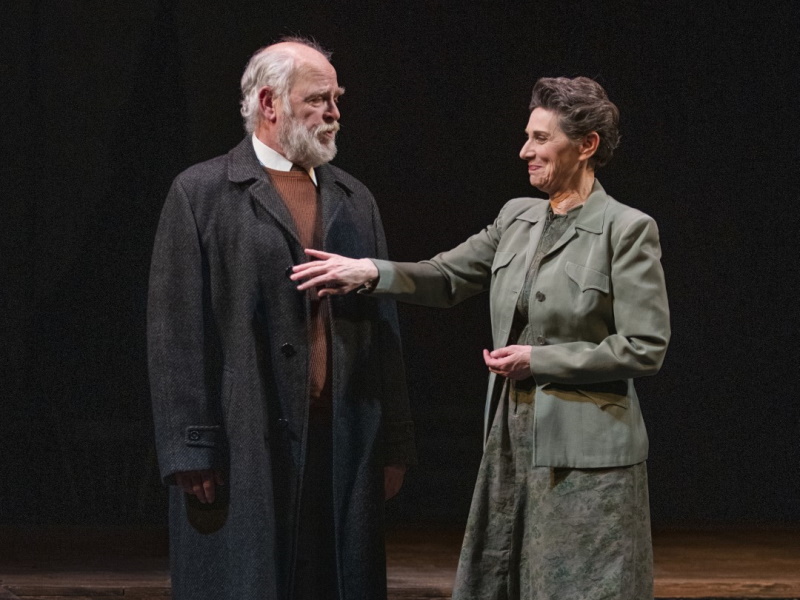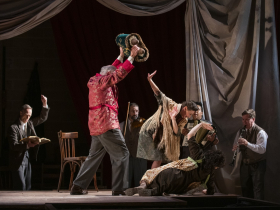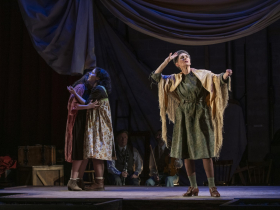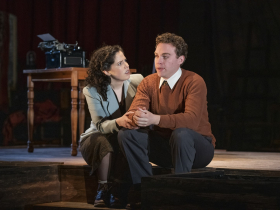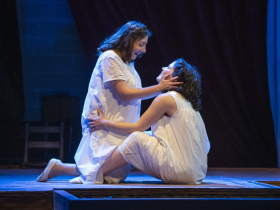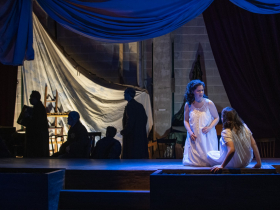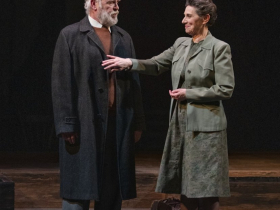‘Indecent’ Offers Tangy Slice of Theater History
But Paula Vogel’s play about playwright Sholem Asch’s travails bogs down in over busy Chamber Theatre staging.
Pulitzer Prize winning playwright Paula Vogel recounted in New Yorker magazine going through 40 drafts before Indecent took to Broadway in 2017. It is a deeply meant study of how an attack on religious hypocrisy combined with an honest portrayal of lesbianism in Sholem Asch’s play God of Vengeance – written in Yiddish in 1906 and later going through many language translations — met with controversy and hatred of his work stemming from America and its courts, and based on anti-Semitism.
With so sturdy an author and cast, with such a scintillating veil of theatrical scholarship, I frankly expected to be lifted by this production rather than feeling it was unfolding behind a fog of well-intentioned dramatic derivatives.
The commitment of Vogel and theater people in general to this work attracted a topnotch cast of the actors who have made Wisconsin their home – James Ridge, Angela Iannone, Josh Krause, James Pickering and many others who could work anyplace, but have chosen the Milwaukee Chamber Theatre through March 27 at the Cabot Theatre of the Broadway Theatre Center.
Yet there is a key to why the production itself feels so heavy-handed. It is is partly the playwright’s fever for the topic and a reliance on repetition (similar things keep happening to the company), pounding the anti-Semitism point home.
But Vogel has also given a clue to directors in how to fight against the weight. She has added lively interludes along the tragic way – a spritely klezmer band (Jewish folk music), jazzlike snippets of various tunes from various eras, rollicking stretches of dialogue and a spinning dance overlay that reminds us how much Bob Fosse borrowed from Jewish culture. These interludes should have added oomph to the story, but rarely do. There is hardly a laugh to be found along the way.
There are also attempts at language humor as the players do sections in Yiddish (in which the play sounds more poetic) while learning fractured English.
Director Brent Hazelton has used these elements not to provide real variety of tone, but to add to the sense of dark-lit tableau staging, rapid changes of scene and freezed action, mainly a ponderous tone as the Asch play is subject to all manner of censorship or bowdlerizing to emphasize the brothel aspects of its sex appeal. If you examine the scenes in which this all takes place, you’ll see more spots and dialogue exchanges the actors could have humanized. But the busyness of the production prevents that.
Krause as the young author slowly aging into cynicism must also bide his time to paint the doubts within the original playwright. There are other standouts in unlikely moments – Elyse Edelman and Rachael Zientek may get the most attention for portraying the lesbians in the rain (which they do winningly), but they smoothly adapt to many roles and also sing delightfully together. That alone ought to allow the contrast the production badly needs, yet that veil of overthinking keeps intruding.
Pickering plays variations on the older roles with accomplished versatility while Eric Damon Smith moves capably from song and dance man to momentary villains.
The theme of condemning anti-Semitism and the tragedy that follows — as little crimes become bigger ones — are important for our times. But the theme so penetrates the play’s fabric that the production needs to fight against simply repeating the insights and take advantage of the entertainment values provided to give the audience both deeper relief and more frequent opportunities for re-engagement.
Indecent Gallery
Dominique Paul Noth served for decades as film and drama critic, later senior editor for features at the Milwaukee Journal. You’ll find his blog here and here.
Review
-
Ouzo Café Is Classic Greek Fare
 May 23rd, 2024 by Cari Taylor-Carlson
May 23rd, 2024 by Cari Taylor-Carlson
-
‘The Treasurer’ a Darkly Funny Family Play
 Apr 29th, 2024 by Dominique Paul Noth
Apr 29th, 2024 by Dominique Paul Noth
-
Anmol Is All About the Spices
 Apr 28th, 2024 by Cari Taylor-Carlson
Apr 28th, 2024 by Cari Taylor-Carlson
Theater
-
‘The Treasurer’ a Darkly Funny Family Play
 Apr 29th, 2024 by Dominique Paul Noth
Apr 29th, 2024 by Dominique Paul Noth
-
Rep’s Nina Simone Play a Puzzle
 Apr 23rd, 2024 by Dominique Paul Noth
Apr 23rd, 2024 by Dominique Paul Noth
-
Skylight’s ‘Eternity’ Is a Slam Bang Show
 Apr 15th, 2024 by Dominique Paul Noth
Apr 15th, 2024 by Dominique Paul Noth

